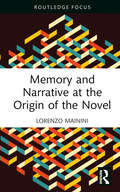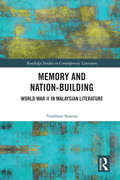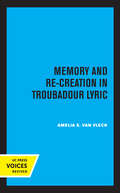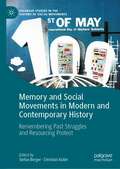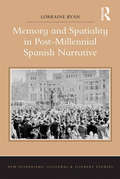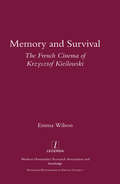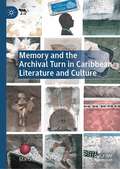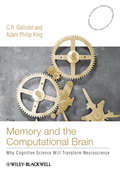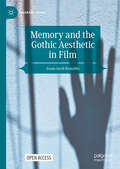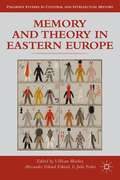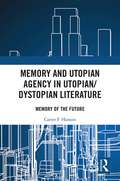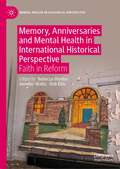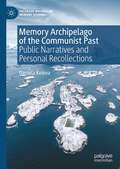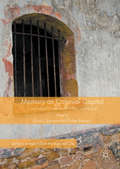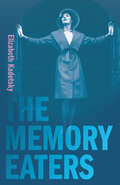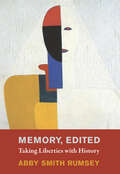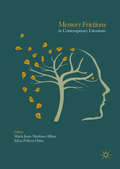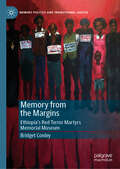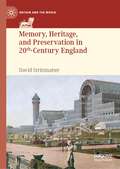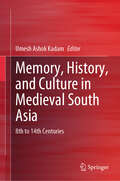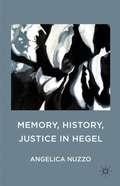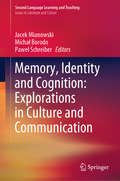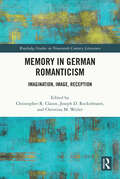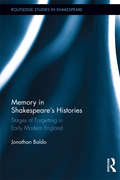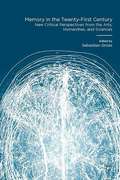- Table View
- List View
Memory and Narrative at the Origin of the Novel: Three studies, from Chrétien de Troyes to Proust (Young Feltrinelli Prize in the Moral Sciences)
by Lorenzo MaininiThis book investigates certain recurrent structures in the history of the novel as a textual genre and as a narrative form typical of Western literature. From its origins, in the vernacular cultures of the twelfth and thirteenth centuries, the novel text seems to be characterised by certain stylistic procedures adopted to represent a new narrative framework, which has no direct terms of comparison in the previous literary tradition. Indeed, the novel, as a ‘textual machine’, often produces a ‘narrative manipulation’ of time and duration, to the point of establishing, along its development, a very close link between History, individual memory and a prospective narrative future. This book explores some structural and formal paths of the ‘novelistic machine’, through three exemplary cases: (1) the ‘name of the novel’ at the origins of the literary genre, with the invention of a new ‘novelistic technique’ (i.e. the conjointure) by Chrétien de Troyes (twelfth century); (2) the bookform, namely, ‘the book of novels’ as a concrete and material object that transmits the narrative text and involves itself within the fictional universe; (3) the literary topos of the ‘dreaming incipit’ and its long history from the Roman de la rose to Proust. This book will be of significant interest to students and scholars of medieval literature, the history of the novel and philology.
Memory and Nation-Building: World War II in Malaysian Literature (Routledge Studies in Contemporary Literature)
by Vandana SaxenaNations are built by narrating their past. Threads of common memories weave the fabric of the national culture, integrating the heterogenous communities into the idea of a single nation. In multicultural societies, the process is a messy one. Different communities remember the past from perspectives that often clash with each other. Multiple memories of a multicultural nation challenge the idea of a singular national identity and call for multiple forms of belonging. Memory and Nation-Building explores the contemporary images of World War II in Malaysian literature and the continuing significance of the conflict in the collective memory and nation-building in Malaysia. Given the multicultural nature of the nation, the War memories of Malaysia are multiple and often contradictory. In the contemporary Malaysian literature, these memories embody the search for a historical narrative that would accommodate the cultural and ethnic diversity of the country.
Memory and Re-Creation in Troubadour Lyric
by Amelia E. Van VleckThis title is part of UC Press's Voices Revived program, which commemorates University of California Press’s mission to seek out and cultivate the brightest minds and give them voice, reach, and impact. Drawing on a backlist dating to 1893, Voices Revived makes high-quality, peer-reviewed scholarship accessible once again using print-on-demand technology. This title was originally published in 1991.
Memory and Social Movements in Modern and Contemporary History: Remembering Past Struggles and Resourcing Protest (Palgrave Studies in the History of Social Movements)
by Stefan Berger Christian KollerReflecting the growing interest of historians in memory studies, this edited collection examines the relationship between memory and global social movements from 1848 to the present. For a long time, there has been little attempt by historians to consider memory and social activism in an integrated, systematic, and comparative way. However, in recent years, scholars have demonstrated that social movements rely on collective memories to assert claims, mobilize supporters, and legitimize their political visions, while also helping to further shape collective memories. This book delves into the synergies between memory studies and social movements, exploring how social movements have been constructing and creating memories of their own activity, how specific landscapes of memory have influenced social movements, and how activists have used memory as a cultural resource to further their own goals and ambitions. The case studies presented cover a range of different types of political activism, including the fights for workers’, gay, feminist, and pacifist rights, as well as ecological, urban, and far-right movements across the globe, portraying the diverse interrelations that exist between social movements and collective memory.
Memory and Spatiality in Post-Millennial Spanish Narrative (New Hispanisms: Cultural and Literary Studies)
by Lorraine RyanFocusing on literary texts produced from 2000 to 2009, Lorraine Ryan examines the imbrication between the preservation of Republican memory and the transformations of Spanish public space during the period from 1931 to 2005. Accordingly, Ryan analyzes the spatial empowerment and disempowerment of Republican memory and identity in Dulce Chacón’s Cielos de barro, à ngeles López’s Martina, la rosa número trece, Alberto Méndez’s ’Los girasoles ciegos,’ Carlos Ruiz Zafón´s La sombra del viento, Emili Teixidor’s Pan negro, Bernardo Atxaga’s El hijo del acordeonista, and José MarÃa Merino’s La sima. The interrelationship between Republican subalternity and space is redefined by these writers as tense and constantly in flux, undermined by its inexorable relationality, which leads to subjects endeavoring to instill into space their own values. Subjects erode the hegemonic power of the public space by articulating in an often surreptitious form their sense of belonging to a prohibited Republican memory culture. In the democratic period, they seek a categorical reinstatement of same on the public terrain. Ryan also considers the motivation underlying this coterie of authors’ commitment to the issue of historical memory, an analysis which serves to amplify the ambits of existing scholarship that tends to ascribe it solely to postmemory.
Memory and Survival the French Cinema of Krzysztof Kieslowski
by Emma Wilson"Kieslowski's last films have indelibly marked the past decade. His cinema has renewed the representation of the human subject and emotion in film: space and luminous surface reveal the finest, most fragile impressions of states of mind and human consciousness. This study is the first to offer specific focus on Kies'lowski's last films, on his French-language cinema and its place within the broader context of French film-making. Engaging with Deleuze's discussions of the time-image, and recent work in trauma theory, Emma Wilson offers radical insights into the innovation in Kies'lowski's explorations of memory, temporality, loss and desire. A charged defence of Kies'lowski's work, Memory and Survival offers new readings of this cinema of blind chance and fleeting beauty."
Memory and the Archival Turn in Caribbean Literature and Culture (New Caribbean Studies)
by Marta Fernández CampaThis book discusses an archival turn in the work of contemporary Caribbean writers and visual artists across linguistic locations and whose work engages critically with various historical narratives and colonial and postcolonial records. This refiguration opens a critical space and retells stories and histories previously occluded in/by those records, and in spaces of the public sphere. Through poetics and aesthetics of fragmentation largely influenced by music and popular culture, their work encourages contrapuntal ways of (re)thinking histories; ways that interrogate the influence of colonial narratives in processes of silencing but also centre the knowledge found in oral histories and other forms of artistic archives outside official repositories. Discussing literature and selected artwork by artists from Britain, Cuba, the Dominican Republic, Haiti, Puerto Rico, and Trinidad and Tobago, Memory and the Archival Turn in Caribbean Literature and Culture demonstrates the historiographical significance of artistic and cultural production.
Memory and the Computational Brain: Why Cognitive Science will Transform Neuroscience (Blackwell/Maryland Lectures in Language and Cognition #6)
by C. R. Gallistel Adam Philip KingMemory and the Computational Brain offers a provocative argument that goes to the heart of neuroscience, proposing that the field can and should benefit from the recent advances of cognitive science and the development of information theory over the course of the last several decades. A provocative argument that impacts across the fields of linguistics, cognitive science, and neuroscience, suggesting new perspectives on learning mechanisms in the brain Proposes that the field of neuroscience can and should benefit from the recent advances of cognitive science and the development of information theory Suggests that the architecture of the brain is structured precisely for learning and for memory, and integrates the concept of an addressable read/write memory mechanism into the foundations of neuroscience Based on lectures in the prestigious Blackwell-Maryland Lectures in Language and Cognition, and now significantly reworked and expanded to make it ideal for students and faculty
Memory and the Gothic Aesthetic in Film (Palgrave Gothic)
by Joana Jacob RamalhoThis open access book defines the cinematic Gothic as an aesthetics of memory and exile. Guided by three intersecting concepts – memory, travelling, and touch – it suggests that the cross-border movements of exiles, émigrés, and professional travellers had a crucial impact on the emergence, development, and dissemination of the Gothic. This approach expands the canon to overlooked films, filmmakers, and national traditions. Drawing on film, memory, and gothic studies, the book urges the reader to think across other disciplines, including phenomenology, neurology, cognitive neuroscience, and disability studies. From hands to pianos, accordions, gloves, amnesia, and wounded bodies, the volume proposes a reappraisal of the Gothic by redrawing its scope, retracing its origins, and refocusing attention on surfaces as sites of socio-political meaning.
Memory And Theory In Eastern Europe
by Uilleam Blacker Alexander Etkind Julie FedorIt is the aim of this volume to investigate how academic practices of Memory Studies are being applied, adapted, and transformed in the countries of East-Central Europe and the former Soviet Union. It affords a new, startlingly different perspective for scholars of both Eastern European history and Memory Studies.
Memory and Utopian Agency in Utopian/Dystopian Literature: Memory of the Future
by Carter F. HansonFor a genre that imagines possible futures as a means of critiquing the present, utopian/dystopian fiction has been surprisingly obsessed with how the past is remembered. Memory and Utopian Agency in Utopian/Dystopian Literature: Memory of the Future examines modern and contemporary utopian/dystopian literature’s preoccupation with memory, asserting that from the nineteenth century onward, memory and forgetting feature as key problematics in the genre as well as sources of the utopian impulse. Through a series of close readings of utopian/dystopian novels informed by theory and dialectics, Hanson provides a case study history of how and why memory emerged as a problem for utopia, and how recent dystopian texts situate memory as a crucial mode of utopian agency. Hanson demonstrates that many modern and contemporary writers of the genre consider the presence of certain forms of memory as necessary to the project of imagining better societies or to avoiding possible dystopian outcomes.
Memory, Anniversaries and Mental Health in International Historical Perspective: Faith in Reform (Mental Health in Historical Perspective)
by Rebecca Wynter Jennifer Wallis Rob EllisThis book is the first to explore memory, misremembering, forgetting, and anniversaries in the history of psychiatry and mental health. It challenges simplistic representations of the callous nature of mental health care in the past, while at the same time eschewing a celebratory and uncritical marking of anniversaries and individuals. Asking critical questions of the early Whiggish histories of mental health care, the book problematizes the idea of a shared professional and institutional history, and the abiding faith placed in the reform of medicine, administration, and even patients. It contends that much post-1800 legislation drafted to ensure reform, acted to preserve beliefs about the ‘bad old days’ and a ‘brighter future’ in the state memories of imperial powers, which in turn exported these notions around the world. Conversely, the collection demonstrates the variety of remembering and forgetting, building on recent interest in the ideological and cultural linkages between past and present in international psychiatric practice. In this way, it seeks to trace the pathways of memory, exploring the direction of travel, and the perpetuation, remodeling, and uprooting of recollection.Chapter “The New Socialist Citizen and ‘Forgetting’ Authoritarianism: Psychiatry, Psychoanalysis, and Revolution in Socialist Yugoslavia” is available open access under a Creative Commons Attribution 4.0 International License via link.springer. com.
Memory Archipelago of the Communist Past: Public Narratives and Personal Recollections (Palgrave Macmillan Memory Studies)
by Daniela KolevaThis book looks at the memory of the communist past in Central and Eastern Europe, with a particular focus on Bulgaria: its “official” memory, constructed by institutions, its public memory, molded by media, rituals, books and films and the urban environment, and the everyday or ‘vernacular’ memory. It investigates how the recent past is remembered and the circumstances upon which this memory is conditioned - how is communism/socialism construed as a public recollection? Do these processes differ in the distinct post-communist countries? The book’s first part traces the institutional and political dimensions of coping with the communist past and the second part concentrates on personal reminiscences and vernacular memory. The book will be of interest for researchers and students in the fields of memory studies, Central and East European studies, oral history and contemporary history, as well as for specialists at institutions of memory and memory activists and organisations.
Memory as Colonial Capital
by Erica L. Johnson Éloïse BrezaultThis volume examines the ways that writers from the Caribbean, Africa, and the U. S. theorize and employ postcolonial memory in ways that expose or challenge colonial narratives of the past, and shows how memory assumes particular forms and values in post/colonial contexts in twenty and twenty-first-century works. The problem of contested memory and colonial history continues to be an urgent and timely issue, as colonial history has served to crush, erase and manipulate collective and individual memories. Indeed, the most powerful mechanism of colonial discourse is that which alters and silences local histories and even individuals' memories in service to colonial authority. Johnson and Brezault work to contextualize the politics of writing memory in the shadow of colonial history, creating a collection that pioneers a postcolonial turn in cultural memory studies suitable for scholars interested in cultural memory, postcolonial, Francophone and ethnic studies.
The Memory Eaters (Juniper Prize for Creative Nonfiction)
by Elizabeth KadetskyOn autopsy, the brain of an Alzheimer's patient can weigh as little as 30 percent of a healthy brain. The tissue grows porous. It is a sieve through which the past slips. As her mother loses her grasp on their shared history, Elizabeth Kadetsky sifts through boxes of the snapshots, newspaper clippings, pamphlets, and notebooks that remain, hoping to uncover the memories that her mother is actively losing as her dementia progresses. These remnants offer the false yet beguiling suggestion that the past is easy to reconstruct—easy to hold. At turns lyrical, poignant, and alluring, The Memory Eaters tells the story of a family's cyclical and intergenerational incidents of trauma, secret-keeping, and forgetting in the context of 1970s and 1980s New York City. Moving from her parents' divorce to her mother's career as a Seventh Avenue fashion model and from her sister's addiction and homelessness to her own experiences with therapy for post-traumatic stress disorder, Kadetsky takes readers on a spiraling trip through memory, consciousness fractured by addiction and dementia, and a compulsion for the past salved by nostalgia.
Memory, Edited: Taking Liberties with History
by Abby Smith RumseyAn exploration of historical memory and networks of meaning in the context of today&’s crises of extremism and polarization.As authoritarianism continues to rise around the world, the stories we tell ourselves about what has happened and what is happening become ever more relevant. In Memory, Edited, Abby Smith Rumsey examines collective memory, how it binds us, and how it can be used by bad actors to manipulate us. Bringing forward the voices of a rich cast of Eastern European artists from the past two hundred years—from Fyodor Dostoevsky to Gerhard Richter—Rumsey shows how their work and lives illustrate the devastation wrought by regimes dependent on entrenched lies to survive. This hijacking of the narrative polarizes communities even as it commandeers our future.Through an interdisciplinary lens that includes the best thinking from history, the arts, cognitive science, psychology, and political philosophy, Rumsey lays bare our narratives, showing how they are constructed and how they have changed over time. Ever-aware of resisting the false promise of utopia, Rumsey argues that only by confronting the past and reckoning with the crimes that were committed can we ever hope to heal and gain self-knowledge. Memory, Edited is an indispensable text for anyone who cares about democracy, equality, and freedom in our current age of crisis.
Memory Frictions in Contemporary Literature
by María Jesús Martínez-Alfaro Silvia Pellicer-OrtínThis volume explores the multifarious representational strategies used by contemporary writers to textualise memory and its friction areas through literary practices. By focusing on contemporary narratives in English from 1990 to the present, the essays in the collection delve into both the treatment of memory in literature and the view of literature as a medium of memory, paying special attention to major controversies attending the representation and (re)construction of individual, cultural and collective memories in the literary narratives published during the last few decades. By analysing texts written by authors of such diverse origins as Great Britain, South-Korea, the USA, Cuba, Australia, India, as well as Native-American Indian and African-American writers, the contributors to the collection analyse a good range of memory frictions —in connection with melancholic mourning, immigration, diaspora, genocide, perpetrator guilt, dialogic witnessing, memorialisation practices, inherited traumatic memories, sexual abuse, prostitution, etc.— through the recourse to various disciplines —such as psychoanalysis, ethics, (bio)politics, space theories, postcolonial studies, narratology, gender studies—, resulting in a book that is expected to make a ground-breaking contribution to a field whose possibilities have yet to be fully explored.
Memory from the Margins: Ethiopia’s Red Terror Martyrs Memorial Museum (Memory Politics and Transitional Justice)
by Bridget ConleyThis book asks the question: what is the role of memory during a political transition? Drawing on Ethiopian history, transitional justice, and scholarly fields concerned with memory, museums and trauma, the author reveals a complex picture of global, transnational, national and local forces as they converge in the story of the creation and continued life of one modest museum in the Ethiopian capital, Addis Ababa—the Red Terror Martyrs Memorial Museum. It is a study from multiple margins: neither the case of Ethiopia nor memorialization is central to transitional justice discourse, and within Ethiopia, the history of the Red Terror is sidelined in contemporary politics. From these nested margins, traumatic memory emerges as an ambiguous social and political force. The contributions, meaning and limitations of memory emerge at the point of discrete interactions between memory advocates, survivor-docents and visitors. Memory from the margins is revealed as powerful for how it disrupts, not builds, new forms of community.
Memory, Heritage, and Preservation in 20th-Century England (Britain and the World)
by David StrittmatterThis book explores commemoration practices and preservation efforts in modern Britain, focusing on the years from the end of the First World War until the mid-1960s. The changes wrought by war led Britain to reconsider major historical episodes that made up its national narrative. Part of this process was a reassessment of heritage sites, because such places carry socio-political meaning as do the memorials that mark them. This book engages the four-way intersection of commemoration, preservation, tourism, and urban planning at some of the most notable historic locations in England. The various actors in this process—from the national government and regional councils to private organizations and interested individuals—did nothing less than engineer British national memory. The author presents case studies of six famous British places, namely battlefields (Hastings and Bosworth), political sites (Runnymede and Peterloo), and world’s fairgrounds (the Crystal Palace and Great White City). In all three genres of heritage sites, one location developed through commemorations and tourism, while the other ‘anti-sites’ simultaneously faltered as they were neither memorialized nor visited by the masses. Ultimately, the book concludes that the modern social and political environment resulted in the revival, creation, or erasure of heritage sites in the service of promoting British national identity. A valuable read for British historians as well as scholars of memory, public history, and cultural studies, the book argues that heritage emerged as a discursive arena in which British identity was renegotiated through times of transitions, both into a democratic age and an era of geopolitical decline.
Memory, History, and Culture in Medieval South Asia: 8th to 14th Centuries
by Umesh Ashok KadamThis book explores the dynamic interplay between memory and history during the crucial period from the 8th to the 14th century in medieval India. It takes up an interdisciplinary approach and includes contributions from seasoned scholars and emerging researchers across memory studies, folklore, ethnography, linguistics, literary studies, intellectual history, sociology, epigraphy, and archeology. Thematically organized, the book examines how the past was transmitted through collective memory, including inscriptions, monuments, royal narratives, folklore, language, travelogues, memoirs, religious practices, and ethnography of diverse communities. Departing from conventional historiographical narratives, it analyzes the medieval politico-cultural landscape of the region through a geo-cultural lens, emphasizing historical interactions and cultural preservation in collective memory. An invaluable resource for academics and professionals in history and related disciplines, this book also appeals to general readers interested in Indian history and culture. It is a rich and informative reference resource for students, practitioners, and enthusiasts in social sciences.
Memory, History, Justice in Hegel
by Angelica NuzzoThis reconstruction of the work of 'dialectical memory' in Hegel raises the fundamental question of the principle that presides on the articulation of history and indicates in Hegel's philosophy two alternative models of conceiving history: one that grounds history on 'ethical memory,' the other that sees justice as the moving principle of history.
Memory, Identity and Cognition: Explorations in Culture and Communication (Second Language Learning and Teaching)
by Michał Borodo Jacek Mianowski Paweł SchreiberThe book analyses a variety of topics and current issues in linguistics and literary studies, focusing especially on such aspects as memory, identity and cognition. Firstly, it discusses the notion of memory and the idea of reimagining, as well as coming to terms with the past. Secondly, it studies the relationship between perception, cognition and language use. It then investigates a variety of practices of language users, language learners and translators, such as the use of borrowings from hip-hop and slang. The book is intended for researchers in the fields of linguistics and literary studies, lecturers teaching undergraduate and master’s students on courses in language and literature.
Memory in German Romanticism: Imagination, Image, Reception (Routledge Studies in Nineteenth Century Literature)
by Christopher R. Clason Joseph D. Rockelmann Christina M. WeilerMemory in German Romanticism treats memory as a core element in the production and reception of German art and literature of the Romantic era. The contributors explore the artistic expression of memory under the categories of imagination, image, and reception. Romantic literary aesthetics raises the subjective imagination to a level of primary importance for the creation of art. It goes beyond challenging reason and objectivity, two leading intellectual faculties of eighteenth-century Enlightenment, and instead elevates subjective invention to form and sustain memory and imagination. Indeed, memory and imagination, both cerebral functions, seek to assemble the elements of one’s own experience, either directed toward the past (memory) or toward the future (imagination), coherently into a narrative. And like memories, images hold the potential to elicit charged emotional responses; those responses live on through time, becoming part of the spatial and temporal reception of the artist and their work. While imagination creates and images trigger and capture memories, reception creates a temporal-spatial context for art, organizing it and rendering it "memorable," both for good and for bad. Thus, through the categories of imagination, images, and reception, this volume explores the phenomenon of German Romantic memory from different perspectives and in new contexts.
Memory in Shakespeare's Histories: Stages of Forgetting in Early Modern England (Routledge Studies in Shakespeare)
by Jonathan BaldoA distinguishing feature of Shakespeare’s later histories is the prominent role he assigns to the need to forget. This book explore the ways in which Shakespeare expanded the role of forgetting in histories from King John to Henry V, as England contended with what were perceived to be traumatic breaks in its history and in the fashioning of a sense of nationhood. For plays ostensibly designed to recover the past and make it available to the present, they devote remarkable attention to the ways in which states and individuals alike passively neglect or actively suppress the past and rewrite history. Two broad and related historical developments caused remembering and forgetting to occupy increasingly prominent and equivocal positions in Shakespeare’s history plays: an emergent nationalism and the Protestant Reformation. A growth in England’s sense of national identity, constructed largely in opposition to international Catholicism, caused historical memory to appear a threat as well as a support to the sense of unity. The Reformation caused many Elizabethans to experience a rupture between their present and their Catholic past, a condition that is reflected repeatedly in the history plays, where the desire to forget becomes implicated with traumatic loss. Both of these historical shifts resulted in considerable fluidity and uncertainty in the values attached to historical memory and forgetting. Shakespeare’s histories, in short, become increasingly equivocal about the value of their own acts of recovery and recollection.
Memory in the Twenty-First Century: New Critical Perspectives from the Arts, Humanities, and Sciences
by Sebastian GroesThis book maps and analyses the changing state of memory at the start of the twenty-first century in essays written by scientists, scholars and writers. It recontextualises memory by investigating the impact of new conditions such as the digital revolution, climate change and an ageing population on our world.
